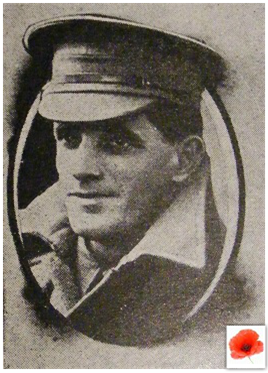Knott , Howard Spencer
Private Howard Spencer Knott was a South Australian soldier, who was involved in what must be one of the more tragic events of World War 1. Howard was the youngest son of William and Jane Knott of Gaza. He embarked from Adelaide on the 22nd of October 1918, aboard the HMAT Boonah A36. The Boonah was a captured German merchant ship of 5,926 tons, and formerly named Melbourne.1 The Boonah was the last troopship to leave Freemantle Western Australia. She carried 1,200 AIF soldiers and was bound for Durban, South Africa. On arrival in Durban, the soldiers and crew were advised that an armistice had been signed, just three days before. It was decided that the Boonah should immediately return to Australia, with all soldiers, and crew on board. In a fateful decision it was decided to unload some of the cargo they were carrying, and load new supplies, needed for the return journey to Australia. Local African stevedores were used to load the stores, and unload the cargo carried from home. Durban was in the grip of an epidemic of Spanish Flu at this time.2

Private Howard Spencer Knott Regimental No 32033
Some of the soldiers became infected with the flu, and in the very cramped living quarters aboard, it soon spread like wild fire.
When the ship arrived back in Freemantle on the 12th December 1918, 300 cases had been reported on board. The ship anchored in Gage Roads, and the local authorities refused to allow anyone to disembark. After some delay it was agreed to allow the 300 worse cases to be transferred to the Quarantine Station, at Woodman Point, South of Freemantle. Three men died on day one at the station. Twenty nursing and medical staff soon became infected. Meanwhile back on board, no one was allowed to leave the ship, not until the seven day incubation period had passed with no more reported cases. Needless to say there was more death and infection in those cramped conditions.
Private Knott must have been one of the first taken to the Quarantine Station; the date of his death was stated as December 13th 1918. Only one day after arriving back in Freemantle. He is buried in the Rockingham Cemetery, Rockingham Western Australia. Twenty seven soldiers died along with four nurses. Seventeen further cases were reported, on the Boonah between Freemantle and Adelaide. They were taken to Torrens Island Quarantine Station, but there were no further deaths.4
It was a terrible waste of young lives. Lives of men who were prepared to die, in battle, for their country, but were struck down by disease, when the war was over.
Researched and compiled by Jim Nelson, a volunteer with the Campbelltown Library “Digital Diggers” group.
If you have any comments or questions regarding the information in this local history article, please contact the Local History officer on 8366 9357 or hthiselton@campbelltown.sa.gov.au
References
- http://alh-research.tripod.com/ships_lh.htm
- https://en.wikipedia.org/wiki/Boonah_crisis
- http://www.ww1.sa.gravesecrets.net/kl---kn.html
- https://en.wikipedia.org/wiki/Boonah_crisis
